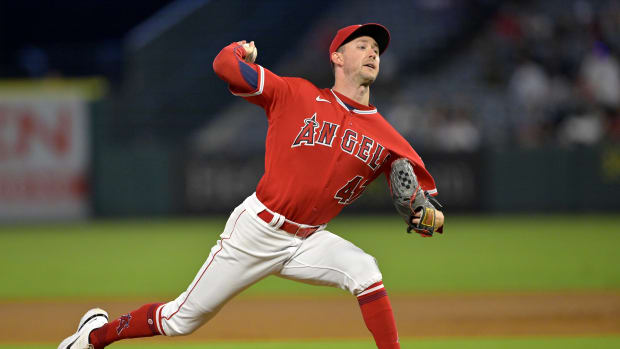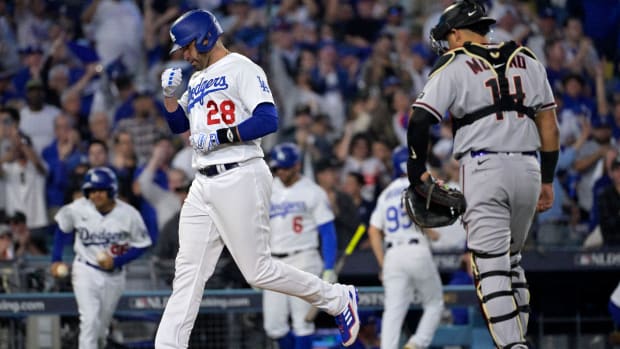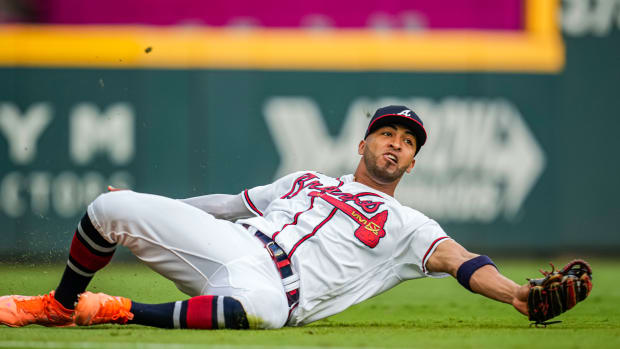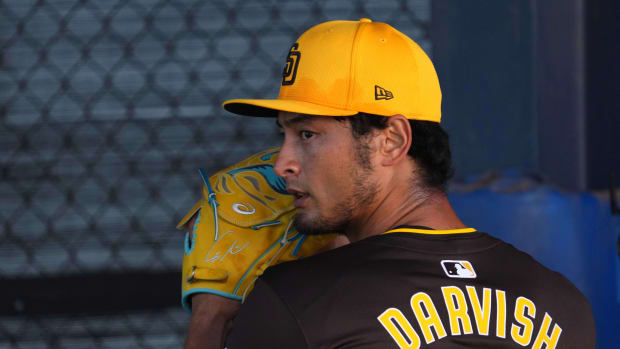
Chelsea Baker dreams of pitching in college and MLB. Can she do it?
Chelsea Baker is a 5'2" high school senior in Florida, with a fastball that tops out in the upper 70s, a nasty knuckleball and dreams of playing in college and maybe even the major leagues. She’s also a girl.
"If possible, that would be the coolest thing ever," Baker said of her reaching the game's highest level.
It's also patently absurd, right?
Maybe not. Although there's been a rule on the books banning women in MLB since 1952, it would be unlikely to survive a legal challenge. A number of women have played collegiate baseball. And just last summer, teenage phenom Mo'ne Davis captured the hearts of the country by pitching her team to the Little League World Series. But by the end of 2014, the 17-year-old Baker hadn't received a single scholarship offer, and Butch Valdes, her coach at Durant High School in Plant City, Fla., hadn't fielded a call from a school expressing interest in her. No major league scouts have contacted her yet, either. She does have a standing offer from the Japanese women's league, but she wants to continue facing the boys.
It's a familiar pattern for Baker that dates back to early childhood. She is completely dismissed. Then she takes the mound, and what becomes undeniable is that she isn't merely capable of holding her own against the boys: She dominates.
"Just about everyone who faces her thinks it's funny," Baker's catcher, Jake Sullivan, explained. "But their opinions change real quick."
In her first varsity season last year, Baker pitched 19 innings, allowing two earned runs for a 0.74 ERA while striking out nine against three walks. But her success goes back farther than that. She threw a pair of perfect games in Little League, leading to a segment on ESPN’s E:60 program. She appeared on the MLB Network reality show, "The Next Knuckler." The Hall of Fame asked for her jersey and displayed it in an exhibit on women in baseball. Last summer she threw batting practice for the Tampa Bay Rays, and then-manager Joe Maddon said afterwards: "She knows what she's doing out there. It's not a gimmick."
So Baker isn't some secret. Her knuckler comes in around 73 mph—faster than the one Tim Wakefield threw in the major leagues, according to Fangraphs. But even as she succeeds at each level, the doubts repeat themselves. Sure, she's a great story, but she can't make it any further, right?
"Impossible, no. Improbable, yes," Cy Young Award-winning knuckleballer R.A. Dickey, who had read about Baker, said in an email when asked about her pursuit of the major leagues. "The speed of the game alone as she starts to play more often against men and better competition will pose a real challenge. I hope that Chelsea keeps going ... despite the odds."
Model slugger: Giancarlo Stanton is no paint-by-numbers superstar
Baker has already overcome long odds just to start her career. Her stepdad, Rod Mason, had to fight to get her included on a coach-pitch Little League team when she was six. But Baker soon learned the pitch that can be the great equalizer: the knuckleball.
She grew up in Plant City down the street from Joe Niekro, who, like his Hall of Fame brother Phil, rode the knuckleball to a long career in the major leagues. Around age seven, Baker begged Niekro to teach her the pitch. He did, and later coached her and his son on their Little League team.
"When I was playing in Little League, I didn't know I'd play high school ball," Baker said, her voice resonating with the pleasant twang you'd expect from a Florida girl. "And then, to throw two perfect games, to be honored by the Hall of Fame, parents would still be talking trash about me, saying she can't play and stuff like that. To a lot of people, that would make them upset, and want to quit. I was like, I'm gonna show them I can play high school ball."
Watching Baker pitch can seem like an optical illusion. Her stepdad put together a DVD to send to college recruiters that show hitter after hitter frozen by her knuckleball. Valdes says, "She's like your little sister, but she'll still put a whuppin' on you ever bit as well as one of the boys."
Still, if Baker is to play after high school, she'll have to overcome another problem that transcends even her size or gender. Scouts are extremely reluctant to invest in a player without being able to project what that player can be in three or five years, and the knuckleball alone makes it virtually impossible to do so. In trying to get to the heart of what Baker can be, we are left to try to see how she fares against competition relative to others who have made the jump to the next level.
Fortunately for Baker, she isn't pitching for just any varsity. She's doing it at a school that has sent several players to the college and professional ranks.
"This [area] is the center of high school baseball," Valdes, her coach, said. "And she's pitching in it, and she's winning in it."
Just getting on the mound at all is impressive considering the talent at Durant. Bryce Gainer, the team's ace, is headed to Division II Mars Hill to play baseball next year. Valdes expects several of his other pitchers to play collegiate baseball as well, and he has a track record to support this. He's got three alums on the pitching staff for the University of Tampa, a Division II program that is always nationally ranked. His best pitcher over the past few years, Tyler Danish, was drafted in the second round by the Chicago White Sox in 2013. (When Danish came back to visit the program, he stepped in the box against Baker. She struck him out.)
Last fall Baker got her first extended starts against the best competition in the area. She took the mound at George Steinbrenner Field against Seminole High School and pitched four scoreless innings. In all she threw 25 innings in fall ball, allowing two earned runs for a 0.72 ERA and yielding four walks against 12 strikeouts. It was all the more impressive coming against a slew of teams who will likely place kids in college programs and the draft.
"She's there for the right reasons. She busts her butt," Valdes said. "You don't know that she's a girl when she's out there."
Players to be named later: Melvin Upton and 10 others who rebranded
Just getting the chance to prove herself in high school depended on a leap of faith by Valdes. He'd known about the Baker story, like everyone else in the area. He'd heard whispers that others believed he wouldn't give her a chance to compete, that Durant's program was too strong to consider her. But then Baker took Valdes' Health and Personal Fitness class her freshman year.
"We talked, and I told her, 'I'm gonna treat you like everybody else, and give you a chance like everybody else,'" he said. "I hope I made her comfortable when she got to the program. But I was hoping she'd come out there and shove it up somebody's rear end."
That's just what Baker did. She made junior varsity first, and Valdes said she didn't allow a run all season.
"She's gonna be an investment for somebody," Valdes said. "We have a ton of scouts around us. It's gonna take a special coach to take a bite and say, 'We're gonna take a chance.'"
Last fall, I mentioned Baker to a major league scout. At first he thought I was kidding. But when he heard about her success and what league she was doing it in, he was shocked. Still, the scout said the best he thought Baker could hope for was a team drafting her very late, with more of an eye on boosting attendance at a minor league affiliate than on actually developing her into a potential major league contributor.
Baker is fine with anything that gives her an opportunity to keep playing, but she wants to succeed on her own merits, not just because she's a girl.
"I don't want to stay out there because of it," Baker said. "If I get the opportunity for any reason, that would be great."
Or as Rod put it: "She'd be the first one to do something else if she wasn't good enough."
There are other opportunities for Baker beyond baseball. She's a good student who has already been admitted to Florida Atlantic. She's hoping to stay local, if possible, so things like the professional contract offer she received from the Japanese women's baseball league aren't on the radar right now. Her mother, Missy Hutchinson Mason, is a dental hygienist, and Baker could see herself doing the same thing. She also taught herself to play the piano and writes her own songs. But she's not ready to give up on her dream to keep playing baseball.
"If I could play college, that would be awesome," Baker said. "And then we'll see what happens."
Hundreds of college programs. Thirty major league teams. All of them, looking for an edge.
"You can't deny the numbers," Valdes said. "But I can't force a college to give her that offer. I can back her up. The numbers are there. They can ask me about the character, I can tell them about her in the classroom, about her on the field. And I'll give 'em all the answers I'm giving you: she's a great kid, she's a hard worker, she gets outs. She gets wins. Is that enough?"
In her YouTube video, Baker stares into the camera, wearing her baseball uniform. Plaques and newspaper articles line the wall behind her. If somebody is willing to give her a chance, she might just add to them.
"Hi. My name is Chelsea Baker, and I'm a senior at Durant High School in Plant City, Florida," Baker says in the video. "I would like to thank you for taking the time to watch my video, and I believe I can help your program win some baseball games."
Is anybody watching? The real question is: Why isn't everybody watching?


































